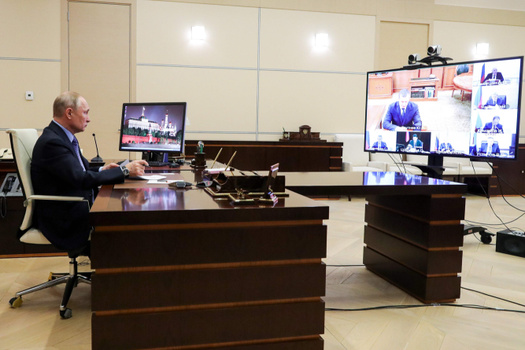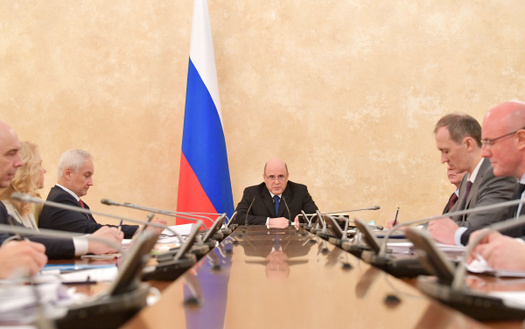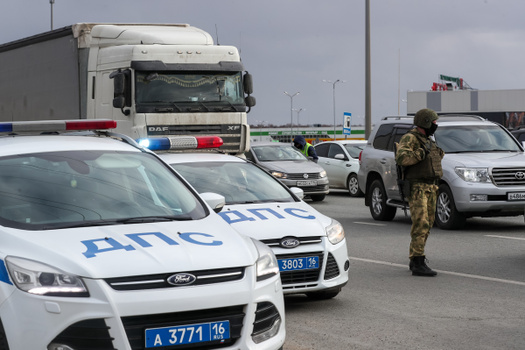
That dirty little word: quarantine How Vladimir Putin and federal officials have avoided responsibility for Russia’s fight against coronavirus
Мы говорим как есть не только про политику. Скачайте приложение.
Last week, Russian President Vladimir Putin addressed the nation about the coronavirus pandemic and unveiled a series of economic relief measures, but he’s refrained so far from taking more drastic actions available to the state. Sources tell Meduza that Putin views these measures as “unpopular” and a threat to his approval rating. The government cabinet led by Prime Minister Mikhail Mishustin, meanwhile, isn’t rushing to declare a national emergency, either.
As of April 1, nearly 3,000 people in Russia had tested positive for COVID-19, but federal officials still resisted calls to declare a state of emergency anywhere in the country. In Kazakhstan, the government declared an emergency after eight coronavirus cases. In Hungary, it took just four. In Russia, regional officials have been forced to manage the spread of the disease largely on their own.
It’s all about ratings
Vladimir Putin has been Russia’s biggest opponent of introducing more severe measures to curb the nationwide spread of coronavirus, multiple sources with ties to the government and the presidential administration told Meduza. According to one person close to the Kremlin with knowledge of the federal coronavirus task force’s operations, the president believes more severe emergency measures would be unpopular and threaten his approval rating. Putin reportedly doesn’t want to take these steps on his own, so he’s entrusted all major decisions concerning coronavirus to Prime Minister Mikhail Mishustin and the government cabinet.
Fielding journalists’ questions about the possible declaration of a state of emergency, Kremlin spokesman Dmitry Peskov constantly redirects reporters to Mishustin and the government cabinet. On April 1, Putin’s press secretary told a TASS correspondent that no one in the Kremlin is currently discussing the possibility of declaring a national emergency because of the coronavirus pandemic.
Russia’s presidency hasn’t always been so skittish about declaring a state of emergency. In 2019, Putin issued an executive order doing just this in the Irkutsk region during heavy flooding. The decision didn’t include any national measures, but it did call out Russia’s military.
In the summer of 2010, when a series of wildfires swept Russia, President Dmitry Medvedev declared a state of emergency in several regions. Russia’s armed forces also assisted in this relief effort. The use of the military is an important feature of the president’s powers in an emergency: legally, this decision is made at the presidential level only when “special response measures” are necessary — in other words, when troops are needed.
A source close to the presidential administration told Meduza that Putin doesn’t want “to scare the people” with “noisy emergency measures.” As a result, the Kremlin has described federal policy in the most neutral terms possible, like “universal self-isolation” and “non-working week.” Another source in one of Russia’s regional governments confirmed to Meduza that the authorities are even trying to avoid using the word “quarantine.”
Political strategist Gleb Pavlovsky says Russia’s federal authorities are likely evading an official state of emergency because of the legal consequences it would cause for the federal government itself (for example, citizens would get the right to seek compensation for damages caused by the state of emergency). Pavlovsky also acknowledges a psychological component and argues that officials want to use everyday rhetoric to address today’s exceptional circumstances, hoping to demonstrate that “everything is fine.”
What about the government cabinet?
Meanwhile, Mikhail Mishustin isn’t exactly chomping at the bit to sign his name to tough decisions about coronavirus, either. A source close to the Kremlin told Meduza that the new prime minister “fears” making these decisions and worries intensely about his own public image. Another source with ties to the Putin administration described Mishustin’s indecision in the following terms: “He’s a technical [prime minister] who’s incapable of undertaking serious measures and I doubt he wants to, anyway.”
One government official told Meduza that Mishustin’s cabinet thinks of a state of emergency or a disaster declaration as a last resort. “For now, they’ve decided to use other, less harsh mechanisms. Only the president can make these decisions [to introduce a federal state of emergency or disaster situation], so it doesn’t really matter who’s for or against the idea,” explained Meduza’s source.
On April 1, however, Putin signed new legislation that gives the government cabinet the power to declare a disaster situation at the federal and regional levels and establish binding rules of conduct for citizens and organizations under these conditions — all without the president.
On March 31, journalists asked Dmitry Peskov why Putin needs to share this authority with the government cabinet. The Kremlin’s spokesman called the expansion of powers “natural.” “The president has these and a whole range of other powers… But direct management of the situation surrounding the fight against the spread of coronavirus is being carried out precisely at the government level, and Prime Minister Mishustin is leading the headquarters, in fact working night and day,” explained Peskov.

But even without the new legislation on emergencies, the government cabinet could have introduced nationwide special emergency measures. The Permanent Government Commission for Preventing and Responding to Emergencies has the power to declare a disaster situation at the federal level. The government cabinet approves the commission’s members and the head of Russia’s Federal Emergency Management Agency (currently Evgeny Zinichev) oversees the group. The commission’s main task is coordinating all state agencies mobilized to address a particular disaster. So far, however, Mishustin’s government hasn’t activated the commission.
A disaster situation and a state of emergency are separate legal concepts regulated by different laws. The former falls under Russia’s law on protecting its population and territory against natural and man-made disasters. These situations occur in specific territories affected by an accident, natural hazard, catastrophe, or any other disaster that threatens to harm human health or the environment, cause significant material losses, or disrupt people’s living conditions.
Disaster situations vary depending on how widely they spread, how many people they affect, how many people they kill or harm, and how much other damage they cause. For example, a situation that results in the deaths or harm of more than 500 people or causes more than 1.2 billion rubles ($15.2 million) is considered a federal-level disaster.
Only a presidential executive order can declare a state of emergency. Once imposed, the president can suspend the powers of local authorities, restrict people’s freedom of movement, increase community policing, control the food trade, ban public assemblies, and so on. Federal law-enforcement outfits like the Interior Ministry, National Guard, Federal Security Service, Emergency Management Agency, and others are responsible for enforcing a state of emergency.
Mishustin’s government also has the power to impose restrictions across the country — a quarantine. Russia’s law on public sanitary and epidemiological well-being states that the federal government can introduce a nationwide quarantine at the surgeon general’s directive. So far, Surgeon General Anna Popova hasn’t issued those instructions. On March 30, she sent a directive to regional leaders and health agency branches enumerating additional measures to fight coronavirus, but she didn’t advocate a nationwide quarantine.
A quarantine includes administrative, public health, veterinary, and other measures to curb the spread of infectious diseases, like restrictions on people’s movements, vehicles, shipments, consumer goods, and animals. But quarantines can only be introduced against the emergence and spread of diseases on a special list maintained by Russia’s Federal Service for Consumer Rights Protection and Human Welfare. COVID-19 still isn’t on that list.
What about the governors?
Tired of waiting for decisive action from the federal authorities, Russia’s regional leaders have started adopting measures with an eye to Moscow — in this case, not the Kremlin but the city administration.
Though governors have the power to declare a local disaster situation, neither Moscow officials nor officials anywhere else have yet gone this far. Instead, Moscow (and then many other regions) declared a state of high alert, which legally speaking isn’t a disaster situation, but it opens the door to this escalation. In late March, the capital and other regions started imposing “self-isolation” regimes, despite no legal basis for the policy.
There have been some concerns about the legality of the measures taken by top local officials in Moscow and other regions. After Sergey Sobyanin imposed self-isolation measures in Moscow, Federation Council Constitutional Legislation Committee Chairman Andrey Klishas accused the mayor of exceeding his authority and argued that only the parliament and president can limit people’s freedom of movement. Later, however, the Telegram channel Besposhchadnyi Piarshchik (“Ruthless PR Man”) published an image of a directive from Moscow Surgeon General Elena Andreeva where she instructed city officials to permit residents to leave their homes only in extraordinary circumstances.
According to Russia’s law on public sanitary and epidemiological well-being and the federal government’s Decree Number 529 on Introducing and Lifting Quarantines, regional officials like Sobyanin are required to introduce “restrictive measures (quarantines)” (including limits on people’s freedom of movement) within 24 hours of such instructions from the local surgeon general. Admittedly, Sobyanin’s executive order did not cite a directive from Moscow’s surgeon general or explicitly mention quarantine or “restrictive measures.” A day later, the mayor’s spokesperson confirmed to Kommersant that Elena Andreeva’s directive is real, but the document is still mysteriously absent from the Moscow health regulator’s official website.
Sergey Sobyanin’s decision making in Moscow opened the gates across Russia. On March 29, the mayor implemented amendments to his declaration of high-alert status, forcing Muscovites to self-isolate at home. That same day, at a meeting with his deputy prime ministers, Mikhail Mishustin explicitly urged leaders in other regions “to pay attention to their [Moscow] colleagues’ experience and consider the possibility of introducing similar measures in their own regions.”
Following these remarks, nearly all governors across the country (leaders in 75 different regions as of April 1) imposed restrictions modeled on Moscow’s self-isolation program, limiting local residents’ freedom of movement. But governors in only two regions — Astrakhan and Krasnodar — dared to mention the word “quarantine” in their executive orders.

Governors are also busy consulting with Moscow’s mayor at the level of Russia’s State Council, where President Putin appointed Sobyanin on March 15 to head a working group on countering the spread of COVID-19. Two days later, Sobyanin also became the first deputy chairman of the federal government’s coronavirus task force (a group headed by Prime Minister Mishustin).
For some time, these two groups seemed to be in competition and state officials wondered which would have the final say on policymaking: the presidential State Council working group led by Sobyanin or the federal task force? Kremlin spokesman Dmitry Peskov later explained that the working group acts as an “advisory body” for the federal task force, exchanging experience and collecting information from regional officials. Sobyanin’s appointment as Mishustin’s deputy on the task force resolved the ambiguity: the prime minister is in charge after all.
The news agency Bloomberg has called Moscow’s mayor “the leading voice for ever-harsher measures that may become the model for locking down the country.” At a meeting with the president on March 24, Sobyanin warned that no one really knows how far coronavirus has spread and he even asked Putin to involve his chief of staff in regional efforts to fight the disease. “I would perhaps ask that Anton Vaino be instructed to direct the presidential envoys to pitch in together here and monitor things very carefully because not all regions understand,” the mayor said. A source with ties to the federal government told Meduza that Sobyanin told Putin roughly the same thing a week earlier at Russia’s coronavirus monitoring center, but this exchange wasn’t reported.
Multiple regional officials in Russia’s Central Federal District told Meduza that many governors have long wanted clearer and more decisive actions from the federal authorities. “Or at least some kind of action model, so we know what we can and should do,” said one source.
At meetings of the State Council’s working group, regional authorities have the chance to convey their thoughts and wishes concerning the fight against coronavirus, but they often merely follow in the footsteps of Moscow city officials. That said, the discussion grew heated during one of Sobyanin’s recent conference calls with regional leaders. According to a source with ties to the federal coronavirus task force and someone in the government, multiple governors requested the suspension of air and rail links to their regions. (State news agencies say Mishustin’s cabinet has discussed this issue.) Sobyanin doesn’t have this authority, however, and he apparently grew visibly agitated before telling the governors to take their issue to the prime minister, sources told Meduza.
One person close to the head of one of Russia’s southern resort regions told Meduza that the governor was forced to adopt tough measures on his own after droves of tourists from Moscow and other major cities flocked to the area following President Putin’s announcement of a national “non-work week.” The hurried restrictions included closing some grocery stores and forcing hotels to admit guests only if they could provide a full set of travel documents, says Meduza’s source.
But the absence of decisive measures by Russia’s federal government in the coronavirus epidemic might not be all bad. Political strategist Gleb Pavlovsky says it’s actually a positive factor. “It would be terrible if the Kremlin tried to exert direct control,” he argues. “The more it shares executive power, the better.”
Story by Farida Rustamaova and Andrey Pertsev
Translation by Kevin Rothrock
(1) What’s up with Putin’s ratings?
According to survey data from the Levada Center, Putin’s job approval rating fell from 68 percent to 63 percent between January and March 2020, while his disapproval rating rose from 31 percent to 36 percent. “This is the lowest this figure has been in the past seven years,” says sociologist Denis Volkov. “Putin’s job approval rating has fallen to its level in 2013 [before the annexation of Crimea]. Right now, even aggregate attitudes about governors are better than about the president.”